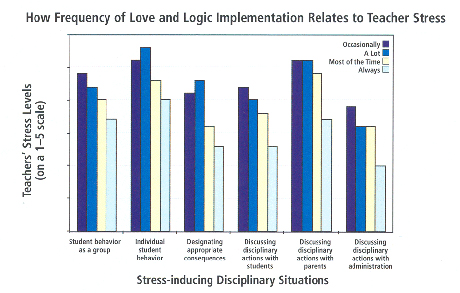Summary
After
spending my first two years of teaching in a constant
state of stress, I chose to find a better way to
deal with student discipline. I transferred to a
new school in my district, not even a mile from
my old school, and immediately noticed the more
relaxed atmosphere. I also immediately noticed that
the students were more disciplined and the teachers
didn’t seem to be stressed about the occasional
inappropriate behavior.
I discovered
that most of the teachers in the school were using
a program called Love and Logic. I anticipated that
by implementing Love and Logic in my classroom,
I would reduce my own stress and develop a class
full of students who were responsible for their
own behavior.
By using
Love and Logic training materials, along with surveys
and interviews conducted with teachers at my school,
and finally my own personal journal, I discovered
some preliminary findings: Teachers who implemented
Love and Logic regularly spent less time dealing
with discipline than those who used it less frequently.
Additionally, teachers who implemented Love and
Logic regularly felt less discipline-related stress
(in relation to dealing with student behavior as
a group or as individuals; designating appropriate
consequences; and discussing disciplinary action
with students, parents, and administrators) than
those who used it less frequently.
With
increased knowledge of Love and Logic skills and
practices, my own stress level decreased in relation
to discipline. As I increased my implementation
of Love and Logic in the classroom, my students
began to take on more responsibility for their behavior
and any resulting consequences. Students also began
attempting to work together to solve issues before
they became problems.

RECOMMENDATIONS
- Districts
should continue to offer the “9 Essential Skills
for the Love and Logic Classroom” course to any
interested teacher.
- Districts
should continue to sponsor the Love and Logic
Club, which will allow teachers already using
Love and Logic to learn new skills and discuss
successes and failures with other teachers.
- Districts
should require all new staff to take the “9 Essential
Skills” course.
- Schools
should continue to include Love and Logic as part
of their achievement plans.
- State
education leaders should promote Love and Logic
training to schools and individual teachers as
part of professional development.
- Include
Love and Logic training and support as part of
the New Teacher Mentor Program.
- Policy
makers should either replace “I Can Do It” (DSEA’s
classroom management class) with Love and Logic
or offer it as an alternative.
- State
leaders should create an online community for
teachers so they can share their successes and
failures with others across the state.
- Education
leaders should include Love and Logic in preservice
training.